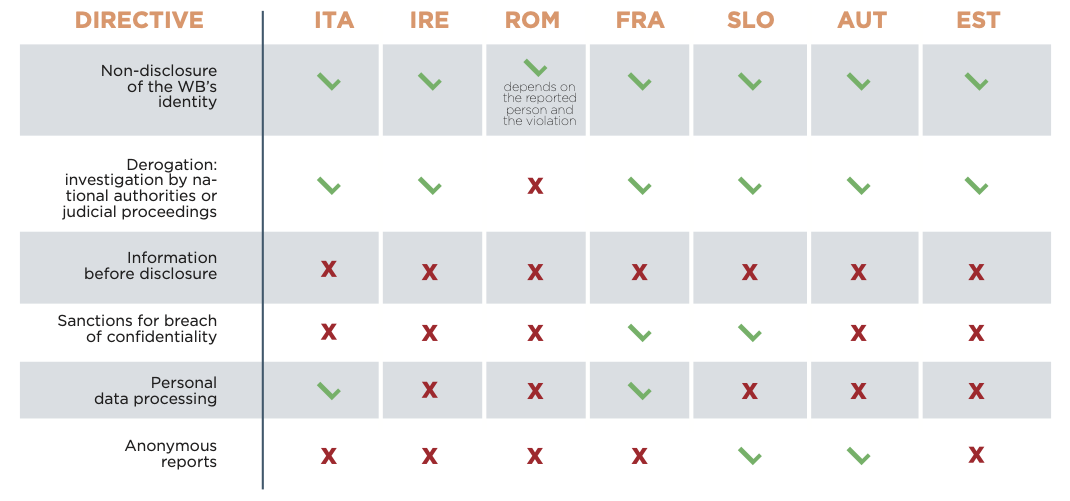Whistleblowing in Italy, Austria, Estonia, France, Ireland, Romania and Slovenia
4. Duty of confidentiality
All of the examined countries incorporate the general
principle stated by the Directive in terms of the confidentiality of whistleblower’s identity, meaning that
that identity should not be disclosed without his/her explicit consent to anyone other than the authorised staff
members who receive and/or follow-up on reports. This
requirement is seen in a broad sense, so that it also includes any other information from which the identity of
the reporting person may be directly or indirectly deduced. French law and Italian ANAC Guidelines - however not yet approved - also includes the confidentiality of the identity of the accused person in the context of the alert.
However, there are several exceptions to this principle,
and therefore circumstances exist in which the identity
can be revealed.
- In Romania confidentiality is always granted if the person involved is the hierarchical superior or has control, inspection and evaluation responsibilities over the whistleblower. If the report concerns corruption, forms assimilated with corruption, abuse while on duty and similar offences, crimes against the financial interests of the Union, or forgery, confidentiality is guaranteed.
- In Italy confidentiality is guaranteed only until the end of the preliminary investigation in the context of criminal proceedings and until the conclusion of the evidentiary phase in proceedings before the Court of Auditors. In the context of disciplinary proceedings, the whistleblower’s identity may be disclosed if the complaint is based, entirely or partly, on the report, and the knowledge of his/her identity is necessary for the accused’s defence, but only with the whistleblower’s consent.
- In Austria, in legal proceedings, whistleblowers must disclose their identity as they will be named as a witness in criminal court proceedings and, therefore, their names will be disclosed to the lawyers representing the defendant.
- In Ireland, the protection of the whistleblower’s identity will not apply if the disclosure is required by law or it is essential for the effective investigation, the public interest, or to prevent crime or risks to State security, public health or the environment.
- In Slovenia, the State Prosecutor, the Police and the Court will safeguard the identity of the whistleblower, unless his/her identity is necessary to safeguard the defendant’s right to a fair trial, and if the disclosure will not place the whistleblower or his/her family in any kind of danger.
However, none of the countries examined appears to adopt the appropriate safeguards envisaged by the Directive. In particular, the Directive states that the reporting person shall be informed before his or her identity is disclosed unless such information would jeopardise the investigations or judicial proceedings.
